Pineboards, previously known as PineBerry, has launched four new Raspberry Pi HAT+ with a PCIe interface: the Hat uPCIty Lite, HatDrive! Piano, Hat mPCIe, and Hat Ai! Dual.
The Polish company decided to change the name from Pineberry to Pineboards since the “berry” name implied they were manufacturing single-board computers, while Pineboards, not to be confused with Pine64 boards, apparently does not :). Nevertheless, let’s have a look at the four new HAT+ boards.
Hat uPCIty Lite – PCIe x4 slot and ATX power supply
- Supported SBCs – Raspberry Pi 5 and other SBCs with a compatible 16-pin PCIe FPC connector and form factor
- PCIe
- 16-pin PCIe FPC connector (input)
- PCIe X4 slot (output) to connect PCIe cards such as NVIDIA or AMD graphics cards; Note: only PCIe x1 Gen2 and Gen3 are supported
- Misc – 12V and PWR LEDs
- Power Supply
- 12V/8A via ATX power connector
- 12V/8A via power barrel jack
- Safety – PCIe Express power delivery is isolated from the Raspberry Pi 5
- Dimensions – 65 x 56.50 mm; HAT+ compatible, 4-layer PCB
That Hat ships with an FPC PCIe ribbon cable, spacer pins, and M2.5 screws, so you only need to add your Raspberry Pi 5 SBC and a PCIe card (graphics, networking., etc…) of your choice to get started.
HatDrive! Piano – NVMe storage meets audio
- Supported SBCs – Raspberry Pi 5 and other compatible SBCs
- Host interfaces
- 16-pin PCIe FPC connector
- 40-Pin Raspberry Pi GPIO header
- Storage – M.2 Key-M 2230/2242 socket for NVMe SSD (PCIe x1 Gen2 or Gen3 only)
- Audio
- 3.5mm headphone jack (which was removed from the Pi 5, but present in all previous versions) with headphone amplifier
- RCA Line Out
- 112dB Audio Stereo DAC from Texas Instruments with 32-bit, 384kHz PCM Interface
- Expansion – 40-Pin Raspberry Pi HAT
- Misc
- PWR and ACT (M.2 activity) LEDs
- Dedicated I2C EEPROM memory with HAT ID, allowing for advanced identification and configuration.
- Power Management
- Continuous monitoring and diagnostics of the power supply bus, measuring voltage, current, and power parameters in real-time via an I2C interface.
- Integrated voltage regulator delivering up to 3A for the 3.3V power rail, compliant with M.2 (NGFF) standard.
- M.2 card power options – FPC PCIe ribbon cable or 40-pin GPIO connector.
- Dimensions – 65 x 56.50 mm; HAT+ compatible, 4-layer PCB
The board ships with an FPC PCIe ribbon cable, spacer pins, M2.5 screws, a spacer pin for M.2 card mounting, and a 40-pin male-female HAT connector.
Hat mPCIe – Cellular and WiFi connectivity via PCIe or USB
Specifications:
- Supported SBCs – Raspberry Pi 5 and other compatible SBCs
- Host interfaces
- 16-pin PCIe FPC connector
- USB 2.0 Type-C connector to use the mini PCIe module with another host
- mPCIe socket with Nano SIM card for WiFi and cellular modules; supports PCIe x1 Gen2 or Gen3 only
- Power Supply
- Integrated voltage regulator capable of delivering up to 3A for the 3.3V power rail
- Input via 16-pin PCIe FPC connector or USB-C port
- Dimensions – 65 x 56.50 mm; HAT+ compatible, 4-layer PCB
The HAT+ board ships with an FPC PCIe ribbon cable, spacer pins, M2.5 screws, and standoffs to connect a mPCIe card.
Hat AI! Dual – Google Coral Dual Edge TPU for the Raspberry Pi 5
- Supported SBCs – Raspberry Pi 5 and other compatible SBCs
- Host interface – 16-pin PCIe FPC connector
- M.2 Key-E 2230 socket compatible with Google Coral Dual Edge TPU M.2 module
- Integrated ASM1182E PCIe packet switch to share the single PCIe lane between two TPUs. Note: Pineboards claims the processing performance is still up to twice the standard TPU module since most data transfers occur when your application is loading the TensorFlow models.
- Misc – LED for monitoring the power input of the board
- Power Management – Integrated voltage regulator capable of delivering up to 3A for the 3.3V power rail, adhering to the M.2 (NGFF) standard.
- Dimensions – 65 x 56.50 mm; HAT+ compatible, 4-layer PCB
The board ships with a FPC PCIe ribbon cable, spacer pins to mount it to the Raspberry Pi SBC, M2.5 screws, and a spacer pin for mounting the M.2 card.
Pricing
All four HAT+ boards are available for the following prices:
- Hat uPCIty Lite – €26.99
- HatDrive! Piano – €32.99
- Hat mPCIe – €18.99
- Hat AI! Dual – €35.99 – The PCIe switch does add a bit to the price…
Shipping is not included but becomes free to most countries for orders over 250 Euros.

Jean-Luc started CNX Software in 2010 as a part-time endeavor, before quitting his job as a software engineering manager, and starting to write daily news, and reviews full time later in 2011.
Support CNX Software! Donate via cryptocurrencies, become a Patron on Patreon, or purchase goods on Amazon or Aliexpress


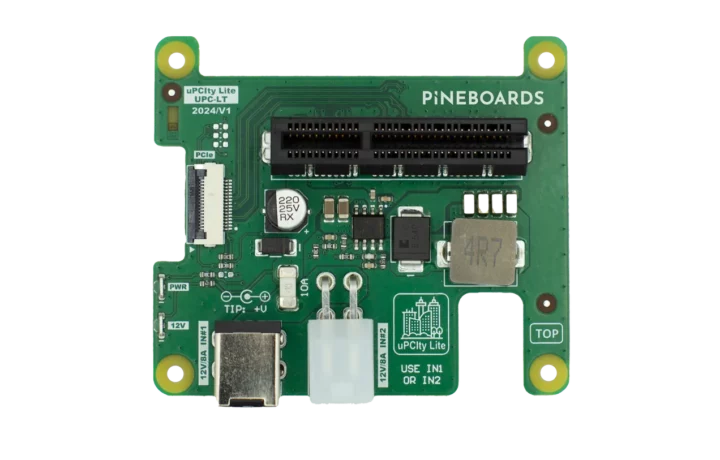
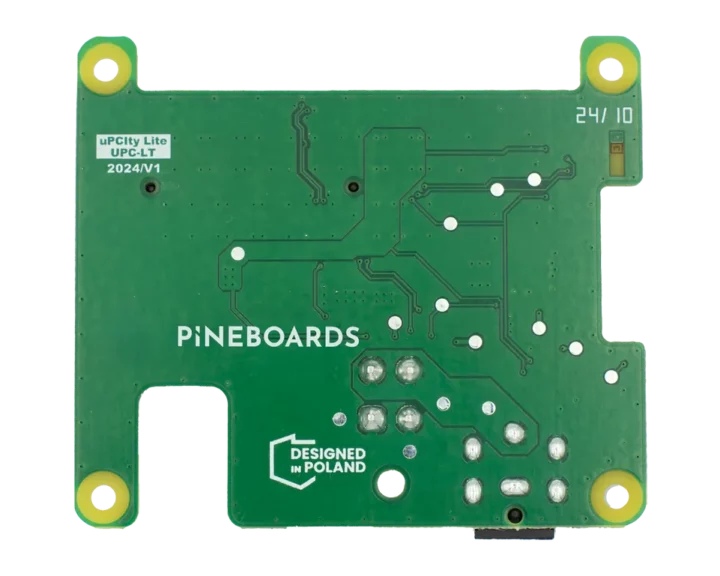
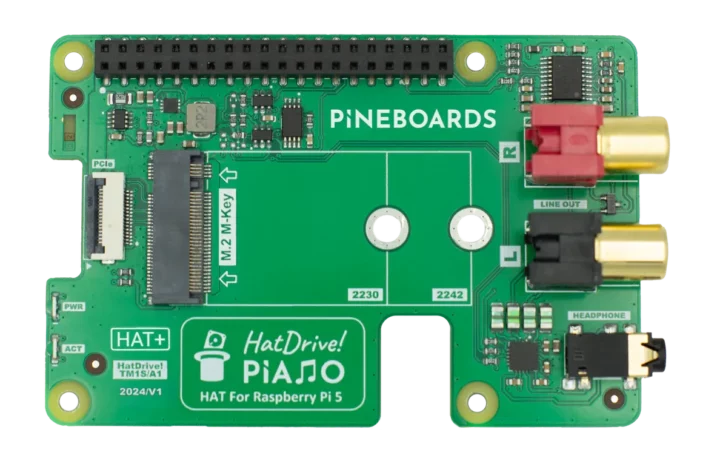
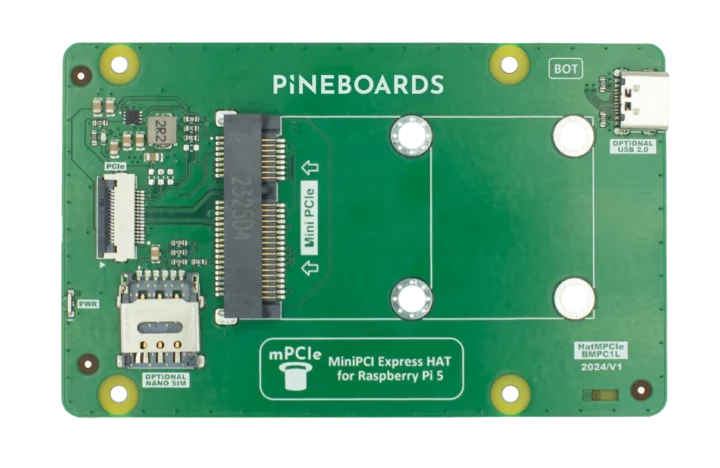
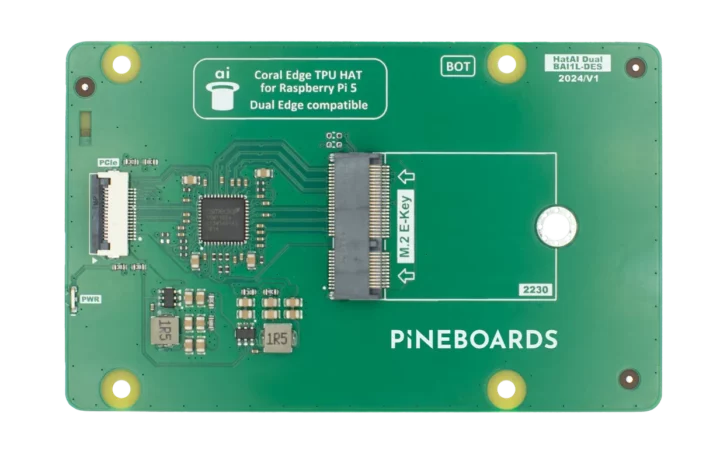



Confusing, why do they call themself pineboards if they don’t have any relation to pine64?
European manufacturer, yet no CE markings and given the lack of power input filtering for the switchers does not bode well for EMI compatibility.
I don’t get the PCI-E adapter. So I’m supposed to power that with an ATX power supply connector, and then run different power supply to the PI? Why not just supply 5V from the board to the Pi directly? Just seems like a lot of work.